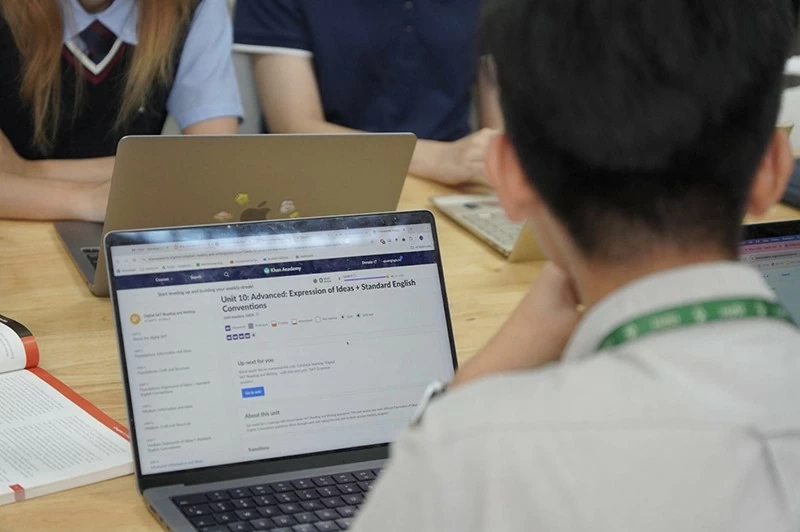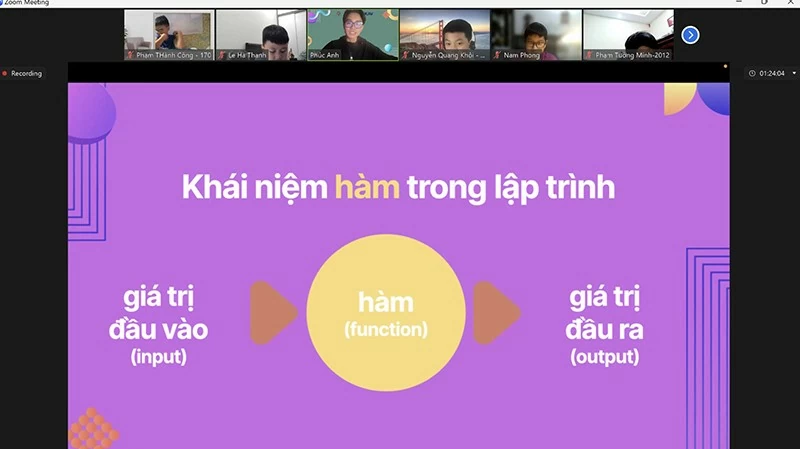
Online education in Vietnam: An inevitable trend for sustainable development and future adaptation
Latest
Online education has been widely utilised across the globe
Online learning offers numerous benefits for both educators and students. Learning has become more straightforward and flexible with the ubiquity of the Internet and the availability of portable smart devices like smartphones and laptops. Students can decide their learning schedules, locations, and content, making education more accessible and adaptable.
The availability of diverse and consistent learning materials, accessible 24/7, enables students to review and manage their learning progress at their own pace. Online education offers considerable flexibility, allowing learners to study in the evening or during lunch breaks and replaying and pausing lessons as needed.
Moreover, with smart devices, students can learn from anywhere, saving time and money on transportation. They can participate in courses renowned educators offer and access international learning resources at minimal or no cost.
Combining traditional teaching with technology-enhanced methods supports better educational outcomes, fosters creativity, and contributes to modernising teaching methods, thereby improving the quality of education and training.
Throughout the world, online education trends are expanding rapidly. With modern technological infrastructure and significant government support, the Asia-Pacific region has become a hotspot for future education innovations.
 |
| Blended online and in-person learning is becoming the trend of the future. |
In Asia-Pacific, the adoption of online learning via mobile devices is prominent. China and India have the most significant mobile phone users—880 million and 470 million, respectively. This widespread mobile infrastructure presents a substantial opportunity for educational development. Countries like Japan, Bangladesh, and South Korea are implementing large-scale national mobile learning projects. These initiatives, supported by policies promoting mobile device use in education, aim to enhance educational standards and literacy. Examples include Malaysia's Smart School, Singapore's FutureSchools@Singapore, and South Korea's Smart Education Strategy.
In Vietnam, online learning and the establishment of digital learning environments are being actively promoted across various educational levels, from primary to vocational schools. Many platforms and applications are now integrated with school curricula, ensuring students can learn anytime, anywhere. For instance, the KAV Open School model by Khan Academy Vietnam, implemented in cities and provinces such as Hanoi, Hoa Binh, Tuyen Quang, Thanh Hoa, Binh Duong, and Kien Giang, enables effective teaching and learning using the Khan Academy platform. Students can follow personalised learning paths, and teachers can assess their progress through AI (artificial intelligence).
AI and Big Data used to create personalised learning experiences are rising. Online learning platforms are becoming increasingly sophisticated, automatically adjusting content and teaching methods to meet individual student needs and progress. Enhanced interactive tools, such as videos, online tests, and educational games, make learning more engaging and enjoyable.
Online education not only ensures knowledge acquisition but also safeguards students' well-being
With nearly 100 million people, including over 20 million students and around 1.5 million teachers, Vietnam has rapidly increased online education adoption. This mode of learning is no longer a temporary fix for challenges like the COVID-19 pandemic but a vital solution for dealing with natural disasters and floods.
Floods and other natural disasters negatively impact the education sector, including implementing curricula, teaching plans, and learning schedules, which may need to be altered, disrupted, or extended beyond the original timeline. These events also affect the psychological well-being of students and parents by causing anxiety and confusion and creating difficulties in managing learners and guiding educational content. Consequently, online education is an effective solution that leverages social resources to ensure that school learning plans remain uninterrupted. Even if students cannot attend school physically, they can continue their studies through online platforms, allowing them to self-learn and review material at home, thereby keeping pace with their school curriculum.
Many international-quality online platforms are now available, with Khan Academy standing out for its extensive free resources in subjects like Math, English, Computer Programming, and SAT preparation. In Vietnam, many Khan Academy courses have been localised to provide open, accessible educational opportunities to students nationwide, regardless of their region or economic background.
 |
| Online classes are not limited by distance or the number of students. |
At Pung Luong Boarding Primary School for the Ethnic Minority in Mu Cang Chai, Yen Bai, where most students are from ethnic minority groups, both teachers and students face significant challenges, such as working under rudimentary shelters and frequently dealing with natural disasters and floods. Vice Principal Kieu Thi Huong said, "We have observed that the Khan Academy platform can assist our school in managing and teaching students more effectively. It also supports enhancing our technological capabilities in teaching, contributing to the digital transformation of education at Pung Luong Primary School and in Mu Cang Chai more broadly. Therefore, we will strive to overcome these challenges to complete the digital transformation and provide the best learning experience for our students."
At Mien Doi Primary and Secondary School, nestled among the rugged Lac Son mountains in Hoa Binh, using Khan Academy represents a significant effort from the teachers due to the severe lack of educational resources. However, as Vice Principal Nguyen Thi Bich Ngoc puts it, "Out of concern for the students, we strive to overcome difficulties to ensure they have a more enjoyable and effective learning experience and access to technology daily. The students at Mien Doi are very dedicated to their studies. Some have to leave for school at 4 a.m. and spend about 2-3 hours travelling. Seeing their eagerness to learn, particularly their enthusiasm for Khan Academy’s video lessons, motivates us to support them as best as possible."
With the adaptation to modern times, online learning is predicted to be a robust and sustainable trend for the future. Online education has ushered in a new era in education, characterised by profound changes and a long-term vision, such as providing access to education for everyone, offering flexibility in time and space, introducing innovative teaching methods integrated with various technologies, and eliminating barriers and distance to ensure educational equality for all students.
| TIN LIÊN QUAN | |
| Over 23 million USD for Ca Mau’s fisheries sustainable development | |
| Project to help with climate change adaptation, development in Dien Bien | |













